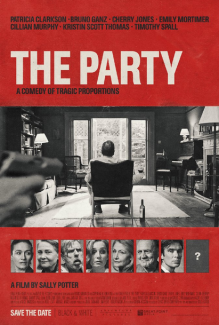The Party (Potter, 2017): Great Britain
Reviewed Larry Gleeson during the Berlin Film Festival.
 Director Sally Potter and her new dark comedy, The Party, found a receptive audience at the Berlin International Film Festival with a near-capacity crowd at the spacious Berlinale Palast Theater. Filmgoers were abuzz after the screening. Potter is most well-known for films Orlando (1992), Tango Lesson (1997),The Man Who Cried (2000) and Ginger & Rosa (2012). She is also an accomplished writer and performance artist.
Director Sally Potter and her new dark comedy, The Party, found a receptive audience at the Berlin International Film Festival with a near-capacity crowd at the spacious Berlinale Palast Theater. Filmgoers were abuzz after the screening. Potter is most well-known for films Orlando (1992), Tango Lesson (1997),The Man Who Cried (2000) and Ginger & Rosa (2012). She is also an accomplished writer and performance artist.
Potter artfully chooses to portray The Party feature in black and white over color. The film opens with an unusual dutch angle-style frame of Bill, portrayed by Timothy Spall, the drunkard husband to Janet, played by Kristen Scott Thomas, a recent ministerial appointment in the British government. The two have decided to celebrate her appointment with a few close friends.
Without much adieu, the film’s other characters are adeptly brought into the fold with revealing details as they begin arriving one-by-one. Janet, the aforementioned appointee and wife of Bill, is having a clandestine affair. Gottfried, played by Bruno Ganz, is the husband of Janet’s most ardent admirer, April, played by Patricia Clarkson. Gottfried has taken up with meditation in public spaces and is a practicing life coach. Tom, portrayed by Cillian Murphy is a high financier – emphasis on high as after he makes a grand entrance he retreats to Janet and Bill bathroom to ingest a fair amount of cocaine and to get a grip on a semi-automatic pistol complete with a hidden body holster.
Next to join the group are Jinny, played by Emily Mortimer and Martha, played by Cherry Jones, a same-sex couple expecting a child. Jinny is three months pregnant fresh off an overwhelmingly successful ultrasound while Martha is a drab, pseudo-intellectual, college professor. Quite an eclectic set of characters to celebrate with!
Imaginatively, Potter intertwines innuendo, double entendre and some wickedly pointed dialogue exchanges in setting the stage for the ensuing drama hiding in The Party’s underbelly. Meanwhile, Director of Photography, Alexey Rodionov is utilizing deep focus and ultra low angle framing, ala Gregg Toland in Citizen Kane, with satirical affect. Editors Anders Refn and Emilie Orsini keep the viewer’s eye moving from frame to frame matching pace with the characters’ rapid-fire bantering.
Expertly, Potter leads the viewer to the precipice where it’s all about to implode into a dark chasm as tempers are starting to flare when Bill flips the entire scenario inside out. The drunkard declares he is terminally ill and then collapses unconscious! The fury seething beneath the surface has found a fissure for its release as the characters all come rushing to aid Bill in his time of need.
The film’s narrative notches up a warp here with some philosophical musings, snarky female comments and Gottfried’s Eastern meditative point-of-view insights. Gottfried’s comments bring some resounding comic relief while also beginning to make sense now in the teetering moments of crisis. As the characters begin revealing their innermost sacrosanct feelings and beliefs, the situation comes to a climax.
Thanks to the casting of Irene Lamb and Heidi Levitt, Potter has considerable talent to work with and she does a nice job of providing ample space for character development. She uses the intellectual bantering very effectively to tap into the charatcer’s emotional reserves revealing some serious sensibilities while keeping the viewer guessing at what is coming next.
And, Potter’s efficiency is remarkable. One character action leads right into another as the plot advances in whirlwind fashion. It is lean and mean and before you can say Jack Robinson, it’s over and and it’s complete.
Very nimbly and quite adeptly Potter and The Party make a seamless, nearly compass accurate, full circle narrative from opening to close with nary a dull moment in between. A highly recommended film.
The Party was a bonafide 2017 Golden Bear contender and was Potter’s eighth feature film. Potter previously took part in the Berlinale Competition in 2009 with Rage.
About this entry
You’re currently reading “The Party (Potter, 2017): Great Britain,” an entry on Student Film Reviews
- Published:
- 03.04.17 / 6am
- Category:
- Berlin International Film Festival 2017, Films
48 Comments
Jump to comment form | comments rss [?]